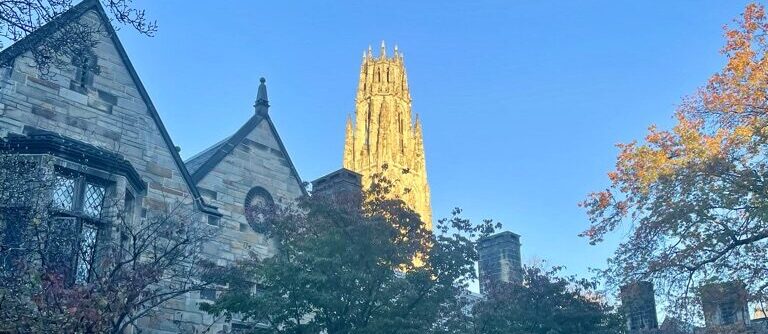By Anaiis Rios-Kasoga ’25
Editor-In-Chief
“Where did you go to high school?”
A cream-colored face looks back expectantly as their question reverberates in the space between us. Their tone expects a certain answer and suddenly that space becomes a valley. I gaze across the cracked opening, paralyzed by the abyss at my feet. They appear characteristically unworried. My eyes lower as I explain that I went to public school in a town they’ve never heard of. I bite my tongue to keep from revealing the following: I traveled twenty minutes to get to that public school because it was far better than the one in the zip code I called home. We’re both disappointed when we agree to continue the chat over a meal that we will never have.
Now, as a sophomore at this obscenely wealthy, predominantly white institution, I’ve had some time to reflect on what it means to me to stand on either end of this valley— what it looks like to occupy space for yourself at Yale while remaining unapologetic about where you come from.
As the ivy-covered walls that had before only existed in my dreams came into view I knew that the class shock of Yale was going to be an adjustment. I’ve never been to The Hamptons, Olive Garden was a fancy night out when I was thirteen, and there was no “college fund” to report as I filled out my FAFSA. Still, I found myself grossly unprepared for the unforeseeable nuances of the class valley, what can be found in the bends and curves between me and an Andover kid. Somewhere in that abyss, I find the trusty black Amex at home in designer jeans, the narrative that we’re all broke college students struggling until we return to Manhattan apartments and financier parents. In the inky darkness lies legacies rushing social clubs, guaranteed flights home (though Christmas is always spent abroad), and little to no thought about how none of it is a universal experience.
“Finding out how much money people were paying to go to high school a year? Like annually? Literal insanity.”- Jaion Kelly ‘25
Though many of us here would quickly admit how we’ve dreamed of this institution, for some, that dream was a paved path, while others had no choice but to claw their way to “the top.” When the big envelope showed up on my doorstep, I understood the precarity of my position. In the six months after my acceptance, I waited not in excitement, but in fear that it would be taken away. Some people laugh now when I tell this story, their amusement signifying that to them, Yale was a promise, a destiny —who was ever going to take it away?
For me, the extravagant displays of wealth that I hear of around campus don’t phase me as much as the small things, I see, but that no one around me seems to notice, (“just take an uber,” or “ask your parents for money!”) It is this added layer, the phenomenon in which no one else views things in the same manner as me that confuses and frustrates me. -Kaycee Portillo-Sorto ‘25
In my first semester, I was overcome with an unbearable emptiness. It wasn’t the result of Imposter Syndrome — I knew I had a right to be here — but of the disconnect, the space in the middle of the valley revealed by the ‘Little Things.’ I envied the lifestyles of people I was beginning to call friends and quickly became overwhelmed with guilt. The desperation to be something I wasn’t required me to feel shame about what I was. There is an intoxicating carefree aura that surrounds the wealthy; they feel the freedom to have and do anything financial or otherwise. The assumed willingness to go out to dinner and split the bill evenly, the general ease with which they maneuver life. Within the stone walls of Yale, we have surface-level access to everything that rich kids do: the same classes with the same professors, the same food in the dining halls, and the same dorms. This platitude, of course, comes with caveats, the foremost of which is that the yearning for that freedom will never be satiated by proximity to it.
“Even though everyone faces rejection, the way wealthier people face rejection is from an ‘I’ve had everything and now I have nothing; point of view, whereas the low-income perspective is; I never had anything and now I still have nothing.”-Joanna Ruiz ‘25
“Not only is wealth the majority, but it’s also amplified on a scale I didn’t even know was possible… you know that celebrities and billionaires exist but you don’t really think about them because that’s so unattainable…to see my preconceived conception of wealth be completely blown out of the water — it just completely shook my world.”-Maverick Williams ‘25
To be low-income and attend Yale is a complex mess of guilt and desire; it is both a wanting and a shame of wanting. My perspective has fluidly and constantly changed in the time since I arrived, and I have no doubt it will continue to. But since my first semester here, I’ve consciously chosen to step away, to watch the person on the other side fade into an indiscernible dot. I dont have an answer to closing the valley. I can’t say if it would be best to construct a bridge, fill in the black hole with cement, or to attempt to jump across. I can say, however, that it is my choice to turn around and give myself the grace of figuring out my path.
I don’t want to minimize that emptiness in your chest that the space across the valley creates. It is nuanced, and hard, to decide to turn away from the, alluring blackness below your feet. I know the constant discomfort and self-doubt that plagues your mind, the desire to emulate the fundamental security that exists on the other side.
What I want to say is this: if you’re at Yale after attending a public school in a town you were desperate to escape, the burden of class displacement–though it feels impossible to escape and even more impossible to embrace–is not our responsibility to bear.
It may be impossible to ever get far enough away from the edge to feel comfortable, but I have taken some time to explore my side of the valley. I have felt the warmth of the sun on my face in beds of green grass and walked along streams that run clear. I spend time on the banks looking at my reflection, feeling content with what I see.
With Special Thanks to Gavin Guerrette’25


